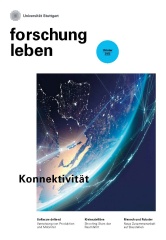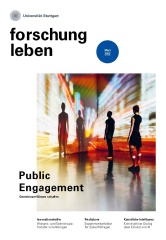2/2022 Connectivity
The focus of the content is on connectivity. We highlight cyber-physical worlds in which production and mobility are networked and made more flexible in a "software-defined" way, and ideas for completely new products with innovative functions.
Allow yourself to be transported to cyber-physical worlds in which production and mobility are networked and made more flexible in a "software-defined" manner, and to experience ideas for completely new products with novel functions. Discover how our visionary Prof. Sabine Klinkner is pushing the development of small satellites, without which neither climate research, networked mobility, nor modern communications would be possible and read our interview with the head of Bosch Research, Dr. Thomas Kropf, in which he explains how artificial intelligence is changing industry and how companies and universities benefit from greater collaboration.
1/2022 - Public Engagement
This issue of 'forschung leben' focuses on the interdependence of science and society. One focus is on citizen-centered research at our Real-World Laboratories. In an interview, Vice Rector Prof. Peter Middendorf reports on how the University of Stuttgart is advancing knowledge and technology transfer, and in a guest article Jens Rehländer explains why science must learn to become more combative.
The subject this year was inspired by Science Year 2022: "Science and society mutually benefit from interaction with each other". And with this in mind, the Federal Ministry of Education and Research (BMBF) and Wissenschaft im Dialog have given the Year of Science 2022 the title "Nachgefragt!" (Participate!) and are focusing on getting citizens more involved in scientific research. The interaction between science and society is also anchored in the University of Stuttgart's mission statement.
2/2021 - Advanced Manufacturing
In this issue of “forschung leben”, which focuses on “Producing the Future”, you’ll read about the many ways in which the University’s researchers are driving this transformation by such means as an interdisciplinary understanding of advanced manufacturing at the Stuttgart Center for Production Technology, the new Center of Excellence for Mass Personalization, the “Mobility of the Future” innovation campus and the Biointelligence Competence Center. And don’t miss the pithy guest article by Dr. Eberhard Veit, an expert in innovation who is also calling for radical change in corporate leadership.
Keywords and terms such as real sustainability rather than “greenwashing,” digitalization and Industry 4.0 – maybe even 5.0 or 6.0 by now – software-defined manufacturing, mass personalization, as well as biotechnology and biointelligence represent a development that not only affects all areas of production and value creation chains, but also has a profound impact in the working environment and, indeed, in the whole of society.
1/2021 - Responsibility
The issue of “forschung leben” deliberates the topic of “responsibility” as a research maxim. The focus is on researchers from the University of Stuttgart, who work at the interface between natural and engineering sciences and humanities and social sciences. Their research activities and findings constantly reflect and consider the economic, social, and cultural implications of their work.
How can we ensure that unfair or discriminating decision-making is prevented when using artificial intelligence? How do the ‘gene scissors’ CRISPR-Cas9 accelerate medical research, and should we involve laymen and women in the debate about genome editing? The new issue of ‘forschung leben’ addresses these and many other issues relating to the topic of responsibility.
2/2020 - Mobility of the Future
The issue of “forschung leben” focuses on the search for future-oriented mobility alternatives. Scientific research and application-oriented technology address the question of how people and goods will be transported to the desired destination in the future. The challenges involved in developing intelligent and, above all, sustainable mobility for our future society are great.
This issue of “forschung leben” presents an overview of the University of Stuttgart’s initiatives and various research activities relating to future mobility, from the “Mobility of the Future” innovation campus and the “Real Laboratory for Sustainable Mobility Culture” to concepts for an emission-free campus, autonomous vehicles, electric aircraft and innovative energy systems.
Issue January 2020 - Intelligent Systems
The new issue of ‘forschung leben’ focuses on the vision of “Intelligent Systems for a Sustainable Society”. What does the concept involve, what specific issues are being researched, what focus areas, areas of expertise and areas of development does the university have, and what does all this mean for science, business and society?
The articles for example shed light on how intelligent systems can make construction more resource-efficient and create space for a new aesthetic. They give information about promising ways of treating cancer patients, and show how international interdisciplinary networking leads to new therapeutic strategies.
Issue 12/2019 - Artificial Intelligence
Whether it's a satnav system in the car or Siri on the cell phone: artificial intelligence has long since found its way into people's everyday lives and is regarded as the fuel for Germany and Europe's ability to compete.
Artificial Intelligence plays a central role at the University of Stuttgart in the implementation of its vision of “Intelligent Systems for a Sustainable Society” and is involved in the interdisciplinary collaboration between multiple disciplines. We would like to give you some insights into these activities in the current issue of forschung leben.
Edition 11/2018 - Health!
Health – is something we all wish to enjoy. Usually, this “greatest good” is ranked higher among the good wishes than categories such as happiness and success.Health-related research has a correspondingly high social value, whereby health research is often equated with medical science per se..However, being able to fully exploit this field of research for the benefit of mankind requires interdisciplinary collaboration In accordance with our vision of “intelligent systems for a sustainable society”, the University of Stuttgart will be focusing even more on the medically-oriented disciplines in the context of the engineering and natural sciences as well as the humanities.But,you can read about the latest fi ndings and achievements in the field of health research that our university can already pass on to society at large in this edition of forschung leben.
Edition 10/2018 - Europe in Focus
The dream of a united Europe is associated, like no other, with values such as freedom, humanism and tolerance. This vision is exemplified by the European research environment, already today a guarantor for the unfettered exchange of people and knowledge, to which many researchers at the University of Stuttgart also contribute in accordance with the maxim „internationally involved and interconnected”, one of the key strategic objectives anchored in its mission statement. In which subject areas is research being conducted at the University of Stuttgart in the context of EU projects? What positive developments are inspired by the multi-cultural environment and what are the challenges? And, can collaborative research really contribute to the concept of a united Europe?
Edition 9/2017 - Technology 4.0
The future of human work has been selected as the Topic of the Scientific Year 2018. Summarized in the term “4.0”, this topic casts light on the breathtaking changes which digitalization is bringing about in our production, our work, and our daily world. New technologies and fascinating new manufacturing processes promise enormous growth in efficiency. But they also raise questions: How can the interaction of man with modern technology succeed?
Edition 8/2017 – Visionaries.
The so-called „Stuttgart Approach“, that is defined in the University of Stuttgart's new mission statement, stands for the interdisciplinary integration of engineering, the natural sciences, the humanities and social sciences on the basis of cutting edge research in each discipline. These maxims are derived from a more encompassing vision: we want to be visionaries for the topics of tomorrow. In this latest edition of forschung leben, you can find out, how our researchers will be breathing life into this vision in the University of Stuttgart’s central research fields and what outstanding achievements they are accomplishing in this context.
Edition 7/2016 – Young. Inspired. Science.
Young people make valuable contributions to science, research, and progress. We exemplify this in the current edition of forschung leben by introducing you to the first-class work of young researchers and their impact on science at the University of Stuttgart. Who are they, what are they working on, and what inspires them?
Edition 6/2016 – Resource efficiency
Raw materials, resources, energy, water, or people: For years the dominating opinion in economics and society was that of a close connection between growth and an increased use of resources. Considering the rapidly growing world population and finite amount of available resources our wealth, competitive ability, and quality of life strongly depend on a sustainable use of resources. How to go easy on resources is the topic of this edition – introducing innovative ideas and technologies in the field of resource efficiency. Enjoy the guest contribution of Prof. Ernst Ulrich von Weizsäcker, Co-chair of the Club of Rome.
Edition 5/2015 – Science Brings the World Together
Tolerance, internationality, and open-mindedness were and still are the basic maxims of the sciences. In the light of the high numbers of asylum-seeking refugees in Europe and Germany this edition focuses on the international cooperations of the University of Stuttgart and grants you an insight into the work of researchers from abroad. The reports and articles illustrate that science can make valuable contributions concerning the support and integration of refugees, because it is based on a tradition of respectful collaborations between people from various cultures and religions.
Edition 4/2015 – City of the future
Following up on the topic of Science Year 2015 “City of the future“, this edition deals with cities as central locations for the development of a sustainable way of life. Sustainable urban development is the joint task of the economy, politics, society, and science. The visions associated with sustainable cities reach far beyond the aspects of architecture or urban planning. Discussions also focus on central challenges of society such as living situations, work, leisure, culture, energy and environment, mobility and traffic, use of space, civic involvement, international diversity and more.
Edition 3/2014 – Science and money
Our editorial team decided to put the special emphasis of the third edition of forschung leben on making the manifold aspects, perspectives, and difficulties of financial funding and its connection to scientific top performances transparent. Read about the different ways money can influence science and which complex financial contexts apply to scientific work – be it the tasks of the German Research Association and Science Council, collaborations between science and economy, the multilayered area of science and technology transfer, or the patron model of endowed professorships.
Edition 2/2014 – Digital society
This edition is only available in German.
Main focus of the second edition forschung leben is the topic of Science Year 2014 – “digital society”. Our authors point out how digitalization influences us, both as individuals and as a society. They discuss the rules of a digital society and ponder how the position of humans in the workplace may change due to the profound effects of digitalization.
Edition 1/2013 – A changing society
This edition is only available in German.
Developments in science and society seldom run parallel; both areas oppose each other in multilayered references and tense relationships. The first edition of forschung leben features a guest contribution by Prof. Peter Strohschneider, the former president of the German Research Association (DFG) who discusses the complexity of the above mentioned relations. His explanations are paradigms for the journalistic focus which the magazine wants to have on social and scientific topics. For starters, our editorial team addresses the topic of “a changing society”.

















